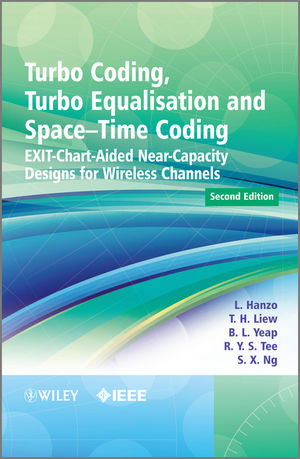Turbo Coding, Turbo Equalisation and Space-Time Coding: EXIT-Chart-Aided Near-Capacity Designs for Wireless Channels, 2nd EditionISBN: 978-0-470-97290-8
Hardcover
680 pages
March 2011, Wiley-IEEE Press
 |
||||||
Tong Hooi Liew received his PhD degree in 2001 from the University of Southampton, UK. Following a one year spell as postdoctoral research fellow, he joined Ubinetcs in Cambridge, UK in algorithm design for 3G mobile station. He then joined TTP Group as a consultant working in mobile TV. Currently he is working as a consultant for Aeroflex in both physical layer and Layer 2 in various wireless technologies like 3G HSPA, HSPA+, LTE and advanced LTE wireless systems. He has over 40 publications in books, book chapters, journal and conference papers. His research interests are associated with coding and modulation for wireless channels, space-time coding and adaptive transceivers.
Ronald Yee Siong Tee received his PhD degree from the University of Southampton in 2008. He was previously involved in research collaboration with Nokia UK in signal processing and handwriting recognition in 2000. From 2001 to 2002 he worked at Nortel Networks Switzerland in the area of data and optical network. In 2003, he was with a local Singapore IT company, where he headed the telecommunication business. Dr. Tee is the recipient of several academic awards, including the Overseas Research Scheme, the ASEAN scholarship, and the Malaysian Government studentships. He is currently with Ernst & Young London, working in forensic technology and electronic disclosure.
Bee Leong Yeap received his PhD in 2000 from the University of Southampton, having been fully funded by the University's Communications Group and the Overseas Research Studentship. He continued his research as a postdoctoral research fellow in Southampton until 2004, working on EU projects such as TRUST and SCOUT. In 2004, he joined RadioScape Plc, London to develop commercial DAB, DRM and DMB receivers. Subsequently from 2008, he has been with Motorola Ltd, Ashburton designing Point-to-Point Wireless Ethernet bridges, which are used to provide connectivity and backhaul for network carriers, Educational Broadcast Service and Federal agencies. To date, he has published two John Wiley/IEEE Press books and over 30 research papers. His research interests include MIMO systems, turbo coding, LDPC, turbo equalisation, space-time coding and adaptive modulation.
Soon Xin Ng received the Ph.D. degree in wireless communications from the University of Southampton, UK, in December 2002. From 2003 to 2006, he was a postdoctoral research fellow working on collaborative European research projects known as SCOUT, NEWCOM and PHOENIX. Since August 2006, he has been a member of academic staff in the School of Electronics and Computer Science, University of Southampton. He is involved in the OPTIMIX European project as well as the IU-ATC and UC4G projects. His research interests include adaptive coded modulation, coded modulation, channel coding, space-time coding, joint source and channel coding, iterative detection, OFDM, MIMO, cooperative communications and distributed coding. He has published over 120 papers and co-authored two John Wiley/IEEE Press books in this field. He is a senior member of the IEEE and a fellow of the Higher Education Academy in the UK.



